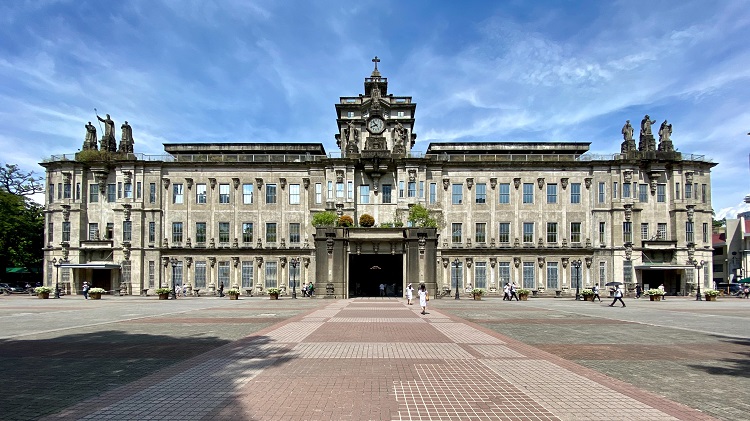Oh, to be young and tormented by school again. Although for entirely different reasons, I must have been Placido at one time or another, more despondent than jubilant in the hallowed halls of the academe.

Chapter 11: Los Baños
The Captain-General is on a working vacation in Los Baños. With him are some friars, Don Custodio, Ben Zayb and Simoun. Among matters settled is the banning of one type of sport pistol to prevent bandits from acquiring more, a decision that came as a result of Simoun’s having been held up and losing his pistols to bandits. The Captain-General also settles the Tiani schoolmaster’s appeal for a better building by suspending him for complaining.
The final point for discussion is the youth’s request to open an academy for studying Spanish. Padre Sibyla opposes it as he thinks it is a form of rebellion, and a challenge to the prestige of the University of Santo Tomas.[1] Padre Camorra and Simoun are against it too. Padre Fernandez believes it is a reasonable request and believes the people’s interests can eventually no longer be denied. On his side are Padre Irene and Don Custodio.
Meanwhile, Juli is in the premises to request for the release of her grandfather, Tandang Selo. Padre Camorra supports her petition and the Captain-General gives his approval.
Chapter 12: Placido Penitente
Placido Penitente walks reluctantly to the University of Santo Tomas. He wishes to withdraw from his studies despite his having been previously known to be a good pupil in his province. With him is Juanito Pelaez, a rich student and teacher’s pet who doesn’t care about his classes.
They arrive at the university entrance where other students gather around, some observing the people arriving at the neighboring church. Among those seen is Paulita Gomez who notices and smiles at Isagani. With Paulita is Doña Victorina who smiles at Juanito.
On their way to class, Placido is detained by a student attempting to convince him to sign a protest against the proposed Spanish academy. As a result he is late for the class roll call, the most important part of class. Placido decides to stay as it is nearly examinations and the teacher hasn’t noticed him yet, as a result of which he may fail the school year.
Chapter 13: The Class in Physics
Padre Million asks students to recite lessons from memory, giving good grades to those who make no mistakes. He calls on a student he sees yawning, and the student immediately launches into a memorized lesson about the classification of mirrors, but is confused when Padre Million asks him questions requiring analysis.
The professor next calls on his favorite, Juanito to answer a question about the composition of mirrors. Juanito signals to Placido for answers, but Placido cannot help and is in turn called upon by the professor. Placido is also unable to answer, and when the professor asks him to recite, he makes mistakes, earning him a bad mark.
Padre Million further announces that Placido has had fifteen absences despite his having really had fewer. Placido reasons that he could not have recited and been absent at the same time. Padre Million insults him for philosophizing. Angered, Placido declares he has had enough and storms off. Padre Million launches into a sermon about the ingratitude of the youth and the impertinence of students requesting to establish an academy for teaching Spanish.
Chapter 14: In the House of the Students
Makaraig’s large house is alive with student activity. Mixed in with those studying are those engaged in horseplay. The noise dies down with the arrival of distinguished students, including the optimists Isagani and Sandoval, a peninsular.[2]
Sandoval believes the permit for the Spanish academy will not be denied, as Spain experiences what the Philippines feels and will not deny the same rights as Spaniards enjoy. Another student, Pecson, is more of a pessimist and thinks that the church may fear that an academy may help Filipinos understand each other, thereby threatening the integrity of the state. He thinks too that the academy attacks the dignity of the University.
Makaraig arrives in a joyful mood and relates how Padre Irene defended their cause, preventing their petition for a permit from getting shelved. Padre Irene succeeded in allowing the formation of a commission under Don Custodio to provide its opinion on the petition. The students brainstorm ideas to influence Don Custodio. Isagani offers to approach Señor Pasta, Don Custodio’s legal retainer, in the hopes of convincing him.
Chapter 15: Señor Pasta
Isagani visits Señor Pasta and relates the developments regarding the students’ petition. Señor Pasta feigns ignorance but actually already knows what has happened and even knows that it was actually Padre Sibyla, who suggested the commission to buy time.
Señor Pasta does not wish to be involved with the students’ cause and tells Isagani that the best way to help the government is to let it do what it thinks is best. He adds that it is offensive to try to do more than the government gives as it injures its prestige. Isagani counters Señor Pasta’s arguments by declaring justice and reason to be stronger bases for colonial government than prestige. He adds that it is reasonable for people to ask a blessing of its government as of a parent.
Señor Pasta advises Isagani to just study hard, marry a rich girl, attend to his religious duties, and to not get involved trying to improve the situation of others and the country. Isagani rejects his advice.
Notes and References:
1. The University of Santo Tomas in Manila is the oldest existing university in Asia. “History,” University of Santo Tomas, accessed July 5, 2020, http://www.ust.edu.ph/about/history/.
2. Peninsulares (peninsulars) were Spaniards born in Spain, while insulares (insulars) were individuals born in the Philippines of Spanish parents. Teodoro A. Agoncillo, History of the Filipino People (Quezon City: C & E Publishing, Inc., 1990), 135-136.
Recent Comments